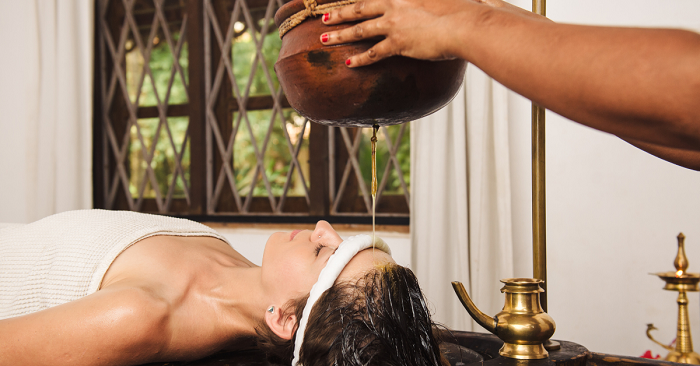
Panchakarma is an ancient Ayurveda detox and rejuvenation therapy that cleanses the body of toxins and balances the three doshas: Vata, Pitta, and Kapha. This holistic procedure not only eliminates the deepest impurities but also strengthens the immune system, digests better, and enhances mental clarity. The five procedures of Panchakarma include Vamana (therapeutic vomiting), Virechana (purgation), Basti (medicated enema), Nasya (nasal administration), and Raktamokshana (bloodletting). This therapy is very effective in managing chronic conditions, stress, and lifestyle disorders as it opens the doors to natural wellness and long-term well-being.
Now let us look at five treatments that embody the principles of Panchakarma therapy in Delhi:
- Vamana (Therapeutic Emesis): Vamana treatment is therapeutic vomiting to eliminate the increased Kapha dosha, which usually affects a person’s breathing patterns and can cause weight gain and other digestive disorders. The preparations include internal and external oils and steam, natural medicines, and vomiting induction for the process. This beneficial treatment cures asthma, chronic allergies, and skin diseases.
- Virechana (purgation therapy): This is a process through which herbs are administered in the patient’s body and the patient feels the impact of purgation in the small intestine as well as the liver, thus eliminating the extra Pitta dosha from the body. In fact, it cures at least a dozen disorders, from jaundice and skin diseases to irritable bowel syndrome (IBS).
- Basti (Medicated Enema): This therapy is one of the most potent therapies in Panchakarma that most favors the restoration of Vata. Basti literally means to pour medicated oils or herbal decoctions directly into the colon through the anus. Basti removes arthritis and eases back pain; it treats constipation and neurological ailments. It also produces excellent rejuvenating effects and has strong immune-gain properties.
- Nasya (Nasal Administration): Nasya is a nasal administration method of herbal oils or powders that cleanses the nasal passage in one’s body. Nasal therapies play a major role for head, neck, and brain disorders. This includes sinusitis, migraines, and nasal congestion. This purification therapy increases mental clarity and sensory perception.
- Raktamokshana (bloodletting): Rakta means blood and hence this process involves purification of blood. In this process, the blood with toxins gets withdrawn, resulting in blood purification. This process helps in treating diseases that are caused by Pitta and Rakta imbalance. Though bloodletting is not common everywhere, it is very efficient for skin disorders, gout, or some inflammatory conditions.
Wrapping Up
Delhi has been home to several reputed centers for Panchakarma treatment. If you are also searching for a naturopathy hospital in Delhi, make sure you choose a certified and reputed facility. Do check the qualifications and expertise of the practitioners and customer testimonials before you select a clinic.
Frequently Asked Questions
Q1. How long does it typically take for the entire Panchakarma treatment to come to an end?
A1. The full project of Panchakarma varies from 7 to 21 days, depending on the individual’s health condition and the therapies that have been prescribed.
Q2. Is Panchakarma therapy safe for everyone?
A2. Yes, under professional Ayurvedic supervision, it is considered safe; however, patients are contraindicated to proceed with the treatment in the case of pregnancy, acute illnesses, or after a few hours of surgery.
Q3. Will I get the treatment at any naturopathy hospital in Delhi?
A3. Sure! Most of the reputed naturopathy hospitals in Delhi provide genuine Panchakarma therapy with a supplement of holistic Naturopathic care.
